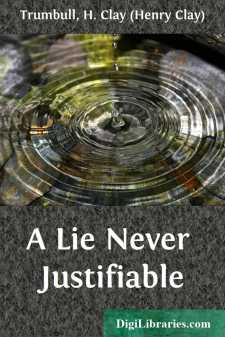Categories
- Antiques & Collectibles 13
- Architecture 36
- Art 48
- Bibles 22
- Biography & Autobiography 813
- Body, Mind & Spirit 142
- Business & Economics 28
- Children's Books 17
- Children's Fiction 14
- Computers 4
- Cooking 94
- Crafts & Hobbies 4
- Drama 346
- Education 46
- Family & Relationships 57
- Fiction 11829
- Games 19
- Gardening 17
- Health & Fitness 34
- History 1377
- House & Home 1
- Humor 147
- Juvenile Fiction 1873
- Juvenile Nonfiction 202
- Language Arts & Disciplines 88
- Law 16
- Literary Collections 686
- Literary Criticism 179
- Mathematics 13
- Medical 41
- Music 40
- Nature 179
- Non-Classifiable 1768
- Performing Arts 7
- Periodicals 1453
- Philosophy 64
- Photography 2
- Poetry 896
- Political Science 203
- Psychology 42
- Reference 154
- Religion 513
- Science 126
- Self-Help 84
- Social Science 81
- Sports & Recreation 34
- Study Aids 3
- Technology & Engineering 59
- Transportation 23
- Travel 463
- True Crime 29
A Lie Never Justifiable
Description:
Excerpt
I.
A QUESTION OF THE AGES.
Whether a lie is ever justifiable, is a question that has been in discussion, not only in all the Christian centuries, but ever since questions concerning human conduct were first a possibility. On the one hand, it has been claimed that a lie is by its very nature irreconcilable with the eternal principles of justice and right; and, on the other hand, it has been asserted that great emergencies may necessitate a departure from all ordinary rules of human conduct, and that therefore there may be, in an emergency, such a thing as the "lie of necessity."
It is not so easy to consider fairly a question like this in the hour when vital personal interests pivot on the decision, as it is in a season of rest and safety; yet, if in a time of extremest peril the unvarying duty of truthfulness shines clearly through an atmosphere of sore temptation, that light may be accepted as diviner because of its very power to penetrate clouds and to dispel darkness. Being forced to consider, in an emergency, the possible justification of the so-called "lie of necessity," I was brought to a settlement of that question in my own mind, and have since been led to an honest endeavor to bring others to a like settlement of it. Hence this monograph.
In the summer of 1863 I was a prisoner of war in Columbia, South Carolina. The Federal prisoners were confined in the common jail, under military guard, and with no parole binding them not to attempt an escape. They were subject to the ordinary laws of war. Their captors were responsible for their detention in imprisonment, and it was their duty to escape from captivity, and to return to the army of the government to which they owed allegiance, if they could do so by any right means. No obligations were on them toward their captors, save those which are binding at all times, even when a state of war suspends such social duties as are merely conventional.
Only he who has been a prisoner of war in a Southern prison in midsummer, or in a Northern prison in the dead of winter, in time of active hostilities outside, can fully realize the heart-longings of a soldier prisoner to find release from his sufferings in confinement, and to be again at his post of duty at the front, or can understand how gladly such a man would find a way, consistent with the right, to escape, at any involved risk. But all can believe that plans of escape were in frequent discussion among the restless Federal prisoners in Columbia, of whom I was one.
A plan proposed to me by a fellow-officer seemed to offer peculiar chances of success, and I gladly joined in it. But as its fuller details were considered, I found that a probable contingency would involve the telling of a lie to an enemy, or a failure of the whole plan. At this my moral sense recoiled; and I expressed my unwillingness to tell a lie, even to regain my personal liberty or to advantage my government by a return to its army. This opened an earnest discussion of the question whether there is such a thing as a "lie of necessity," or a justifiable lie....


